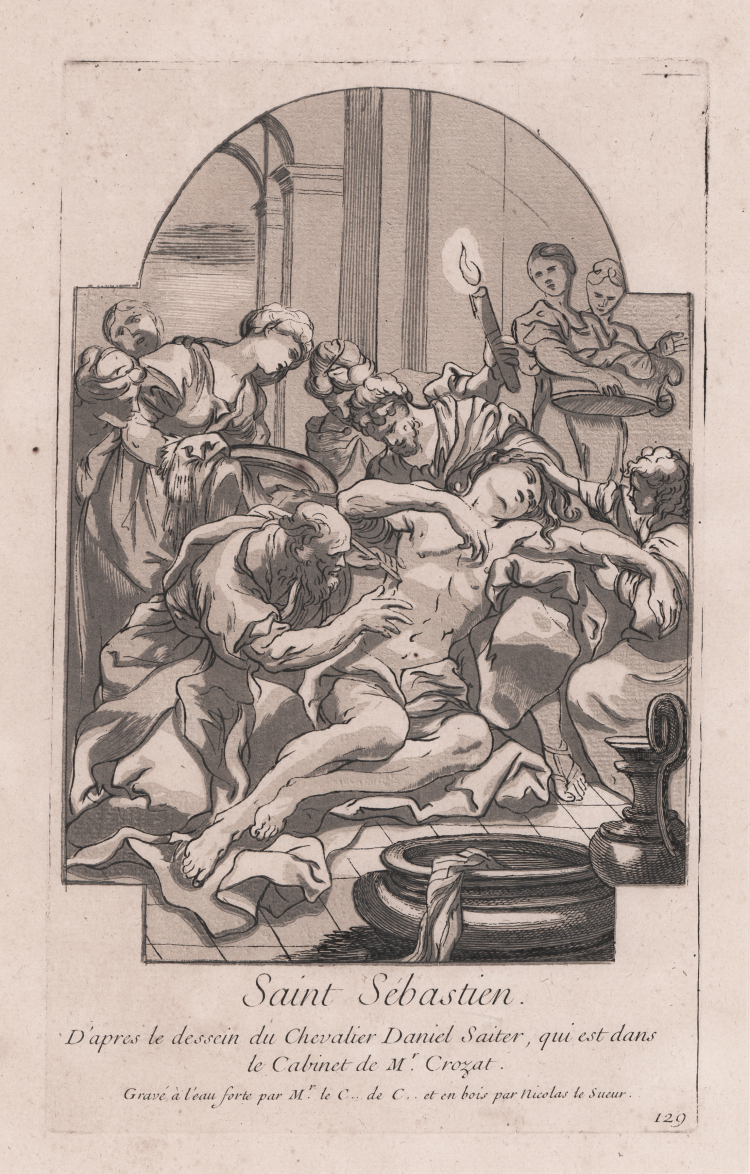



| Reference: | S39241 |
| Author | Anne Claude Philipphe de Turbieres Conte di CAYLUS |
| Year: | 1740 |
| Measures: | 160 x 265 mm |


| Reference: | S39241 |
| Author | Anne Claude Philipphe de Turbieres Conte di CAYLUS |
| Year: | 1740 |
| Measures: | 160 x 265 mm |
Etching and chiaroscuro, 1740 circa, signed at lower center. After Daniel Seiter.
A fine impression, on contemporary laid paper, with margins, perfect condition.
The charoscuro is by Nicolas Le Seur.
The plate is from the series "Recueil d'estampes d'après les plus beaux tableaux et d'après les plus beaux desseins qui sont en France".
Also known as 'Recueil Crozat', is a series of plates commissioned by the collector Pierre Crozat and reproducing famous paintings and drawings of the era; 140 plates were published in 1729. A second volume formed by 42 prints (instead of the 110 plates initially planned) was issued in 1740.
After Crozat's death, the plates were sold to a company of booksellers who commissioned Mariette to reorganize the 'Recueil'; Mariette divided the plates into two volumes, added some missing descriptions, and advertised the set to the public in 1742.
In 1764, Basan bought the plates and the text, and republished the 'Recueil', but replaced the woodcuts by intaglio prints. Basan also published the 45 plates reproducing the Italian paintings from the collection of the Duc d'Orléans in a volume entitled 'Recueil d'après la gallerie du palais royal'.
Anne Claude Philipphe de Turbieres Conte di CAYLUS (Parigi 1692 - 1765)
|
French antiquarian, proto-archaeologist and man of letters, was born at Paris. While a young man, Caylus distinguished himself in the campaigns of the French army, from 1709 to 1714. After the peace of Rastatt (1714) he spent some time in travelling in Italy, Greece, the Levant, England and Germany, and devoted much attention to the study and collection of antiquities. He became an active member of the Académie royale de peinture et de sculpture and of the Académie des Inscriptions. Chief among his antiquarian works must be the profusely illustrated Recueil d'antiquités égyptiennes, étrusques, grècques, romaines et gauloises (7 vols., Paris, 1752-1755), which was mined by the designers of Neoclassical arts for the rest of the century. Caylus was an admirable etcher, and copied many paintings of the great masters. He caused engravings to be made, at his own expense, of Bartoli's copies from ancient pictures and published Nouveaux sujets de peinture et de sculpture (1755) and Tableaux tirés de l'Iliade, de l'Odyssée, et de l'Enéide (1757).
|
Anne Claude Philipphe de Turbieres Conte di CAYLUS (Parigi 1692 - 1765)
|
French antiquarian, proto-archaeologist and man of letters, was born at Paris. While a young man, Caylus distinguished himself in the campaigns of the French army, from 1709 to 1714. After the peace of Rastatt (1714) he spent some time in travelling in Italy, Greece, the Levant, England and Germany, and devoted much attention to the study and collection of antiquities. He became an active member of the Académie royale de peinture et de sculpture and of the Académie des Inscriptions. Chief among his antiquarian works must be the profusely illustrated Recueil d'antiquités égyptiennes, étrusques, grècques, romaines et gauloises (7 vols., Paris, 1752-1755), which was mined by the designers of Neoclassical arts for the rest of the century. Caylus was an admirable etcher, and copied many paintings of the great masters. He caused engravings to be made, at his own expense, of Bartoli's copies from ancient pictures and published Nouveaux sujets de peinture et de sculpture (1755) and Tableaux tirés de l'Iliade, de l'Odyssée, et de l'Enéide (1757).
|